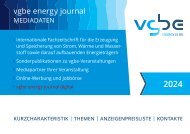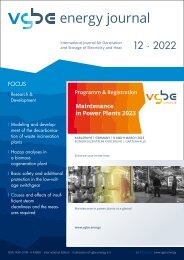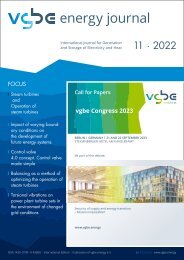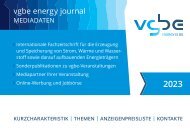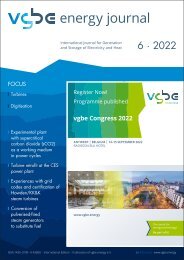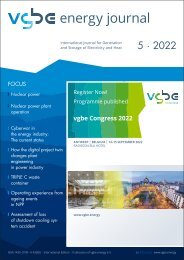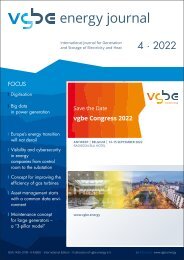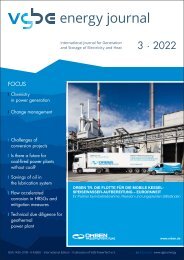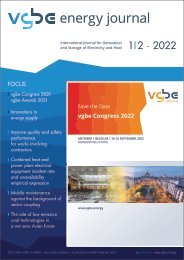VGB POWERTECH 11 (2019)
VGB PowerTech - International Journal for Generation and Storage of Electricity and Heat. Issue 11 (2019). Technical Journal of the VGB PowerTech Association. Energy is us! Power plant operation: legal & technology. Pumped hydro storage. Latent heat storages.
VGB PowerTech - International Journal for Generation and Storage of Electricity and Heat. Issue 11 (2019).
Technical Journal of the VGB PowerTech Association. Energy is us!
Power plant operation: legal & technology. Pumped hydro storage. Latent heat storages.
Create successful ePaper yourself
Turn your PDF publications into a flip-book with our unique Google optimized e-Paper software.
<strong>VGB</strong> PowerTech <strong>11</strong> l <strong>2019</strong><br />
Editorial<br />
The Green Deal of the new EU Commission<br />
A further great challenge for power generation<br />
Ladies and Gentlemen,<br />
On <strong>11</strong> December <strong>2019</strong>, the<br />
European Commission presented<br />
the “European Green<br />
Deal “*, a roadmap to make<br />
the Community economy<br />
sustainable. The challenges<br />
of climate and environmental<br />
protection are to be shaped<br />
as opportunities for all policy<br />
areas and the transition is<br />
to be fair and shaped jointly<br />
with all those involved. EU<br />
President Ursula von der Leyen<br />
accompanied the publication<br />
with the words: “The European Green Deal is our new<br />
growth strategy – for growth that gives us more back than it<br />
takes away ...”. EU Vice-President Frans Timmermanns noticed:<br />
“We are in a climate and environmental emergency.<br />
The European Green Deal is an opportunity to improve the<br />
health and well-being of our people by transforming our economic<br />
model....”.<br />
The Green Deal presented includes a roadmap with measures<br />
to promote the efficient use of resources. The future economy<br />
is to be transformed into a clean and circular-oriented system,<br />
climate change is to be halted, biodiversity preserved<br />
and pollution reduced. It is also essential that the roadmap<br />
and subsequent measures cover all economic sectors, namely<br />
transport, energy, agriculture and buildings, as well as the<br />
steel, cement, information and telecommunications sectors,<br />
the textile and chemical industries.<br />
Key points concerning the energy/electricity sector in the 24-<br />
page document can be summarised as follows:<br />
––<br />
Timeline<br />
The Commission will propose a European climate<br />
law in March 2020 to incorporate the climate neutrality<br />
target for 2050 into Community legislation.<br />
By summer 2020, the EU will present an impact assessment<br />
to revise the greenhouse gas reduction target for 2030 (50<br />
to 55 %).<br />
––<br />
EU climate target and emissions trading system<br />
The Commission will propose a revision of the EU Energy<br />
Tax Directive. It will focus on environmental aspects and<br />
allow the European Parliament and the Council to adopt<br />
proposals in this area by qualified majority rather than unanimity<br />
under the ordinary legislative procedure.<br />
––<br />
National Energy and Climate Plans (NECPs)<br />
Member States will present their revised energy and climate<br />
plans by the end of <strong>2019</strong>. The Commission will assess<br />
the objectives of the plans and the need for additional<br />
measures if the level of the objectives is insufficient. This<br />
will feed into the process of increasing the climate targets<br />
for 2030, for which the Commission will review the relevant<br />
legislation by June 2021 and revise it if necessary.<br />
––<br />
Energy efficiency and smart market integration<br />
Priority will be given to energy efficiency. The European energy<br />
market should be fully integrated, networked and digitised,<br />
while maintaining technological neutrality. Decarbonised<br />
gases are to be increasingly used in the gas sector.<br />
––<br />
Transport<br />
Achieving climate neutrality requires a 90% reduction in<br />
transport emissions by 2050. In 2020, the Commission<br />
will adopt a strategy for sustainable and intelligent mobility<br />
that meets this challenge and addresses all sources of<br />
emissions. The development of electromobility, including<br />
the necessary infrastructure, will be important.<br />
––<br />
Financing and innovation<br />
The Commission proposes a target of 25% of the EU budget<br />
for climate action and will present a European Sustainable<br />
Investment Plan to mobilise up to €1,000 billion over the<br />
next 10 years. Innovations for climate action under Horizon<br />
Europe will account for 35% of the budget.<br />
Following the “World Energy Outlook” with its scenarios for<br />
global energy supply summarised and commented on here in<br />
the last editorial, the EU Commission is currently positioning<br />
itself even more ambitiously for the EU states on climate<br />
and environmental issues as well as energy supply. From the<br />
roadmap it can be generally seen that from earlier considerations<br />
on climate and environmental issues and a fixation<br />
solely on the energy sector, often only electricity generation,<br />
this is seen as a comprehensive social challenge. For the implementation<br />
of the goals, it remains the case that the technological<br />
component will remain the decisive factor in the<br />
implementation. Whether with higher efficiency and better<br />
environmental protection of existing technologies or even<br />
completely new technologies is not yet answered. There is<br />
unlikely to be one solution. Many individual solutions as a<br />
whole are more likely and technology neutrality in development<br />
and application as well as respect for and consideration<br />
of aspects of energy supply security and social components<br />
should not give way to daily guiding principles.<br />
Dipl.-Ing. Christopher Weßelmann<br />
Editor in Chief, <strong>VGB</strong> PowerTech<br />
Essen, Germany<br />
* The European Green Deal: https://ec.europa.eu/info/sites/info/files/<br />
european-green-deal-communication_en.pdf<br />
https://ec.europa.eu/commission/presscorner/detail/en/IP_19_6691<br />
1




